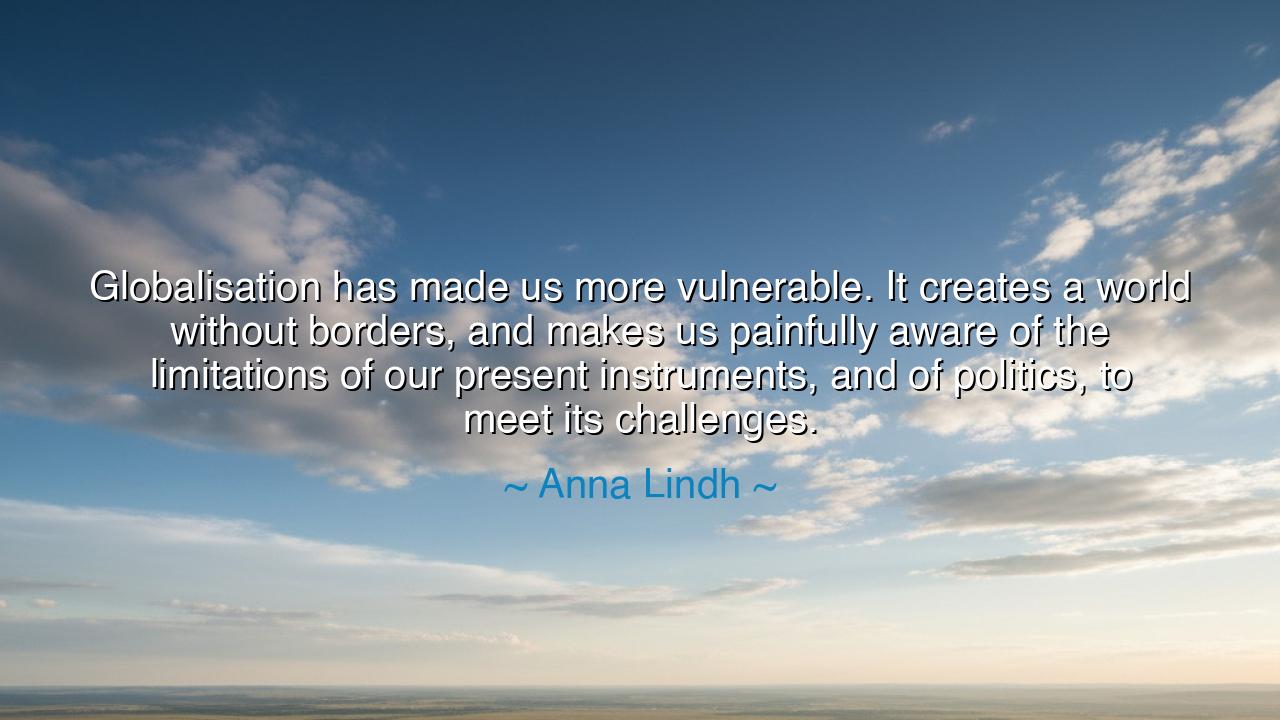
Globalisation has made us more vulnerable. It creates a world
Globalisation has made us more vulnerable. It creates a world without borders, and makes us painfully aware of the limitations of our present instruments, and of politics, to meet its challenges.






Hear, O seekers of truth, the solemn words of Anna Lindh: “Globalisation has made us more vulnerable. It creates a world without borders, and makes us painfully aware of the limitations of our present instruments, and of politics, to meet its challenges.” This utterance is no passing thought, but the cry of one who glimpsed the new age—an age where the walls of nations crumble, and yet the hearts of rulers remain bound to ancient tools too feeble for the storms of tomorrow.
For globalisation, though it weaves nations into one tapestry, also entwines their fragility. A sickness in one land now spreads to all; an economic collapse in one corner shakes the pillars of another. What once was distant becomes immediate; what once was foreign becomes neighborly. Thus, Lindh warns that our instruments of governance, crafted for the narrow borders of yesterday, falter before the vastness of a borderless world.
Consider the tale of the Black Death, which swept from Asia to Europe in the fourteenth century. Though the world then was far less bound by trade and travel than now, still the plague coursed across continents, felling millions. In our age of globalisation, the same peril moves swifter still. The world learned this truth anew when pandemics surged across every land, revealing how politics, bound by borders, could not keep pace with an enemy that knew none.
So too in the sphere of war and commerce. The Great Depression of the 1930s began in one nation, but its tremors echoed across oceans, toppling industries and impoverishing millions. Lindh’s words remind us that when economies, resources, and technologies are bound together, calamity becomes a shared inheritance. Politics, clinging to the illusion of sovereignty, too often proves slow, divided, and unfit for the vastness of these trials.
Therefore, O children of the future, heed this wisdom: to live in a world without borders is to share not only riches and knowledge, but also peril and grief. If our instruments of politics remain narrow and feeble, then the storms of globalisation shall overwhelm us. But if humankind finds the courage to fashion new tools of unity and justice, then what is now vulnerability may yet become strength. Lindh’s words endure as both warning and summons: the fate of one is now the fate of all.






Cchi
This quote by Anna Lindh is a wake-up call about the vulnerabilities we face in a globalized world. While globalization has brought prosperity and connected us like never before, it has also left us exposed to global crises we can't easily contain. How can we rethink global governance to better address the interdependencies that make us more vulnerable? What role should international organizations, like the UN, play in addressing these large-scale challenges?
NHNgoc Hong
Lindh’s statement touches on the stark reality that globalization has brought about new risks, yet our political systems remain ill-equipped to handle them. The idea of a 'world without borders' sounds idealistic, but in practice, it amplifies problems rather than solving them. How do we balance global cooperation with national sovereignty? Can the current political structures adapt to a rapidly changing world, or is it time for a complete overhaul of how we govern on a global scale?
BV44.Nguyen Huynh Bao Vy
I think Anna Lindh’s reflection on the vulnerabilities created by globalization is a powerful one. The interconnectedness of nations today has shown us just how fragile our systems are. With global issues becoming more urgent, like climate change and international trade tensions, do we need a global government or a more unified political strategy? Is there a way to reshape our instruments and politics to effectively deal with the overwhelming scale of these challenges?
AAanh anh
This quote from Anna Lindh highlights a key challenge we face in today’s globalized world—our inability to respond effectively to the far-reaching consequences of global interconnectedness. While we have made great strides in global cooperation, is it enough to address the immediate and complex issues that arise? Are our political systems outdated in dealing with global threats? Perhaps we need a new framework for collective action that transcends national boundaries.
THLuu Thi Hoa
Lindh’s words resonate with the growing concern that globalization is a double-edged sword. On one hand, it’s brought about unprecedented economic growth and communication, but on the other hand, it’s increased our exposure to global risks. What happens when problems in one part of the world, like financial crises or health outbreaks, spread so easily? Can we really keep up with the global pace, or do we need to rethink how we approach international politics and governance?